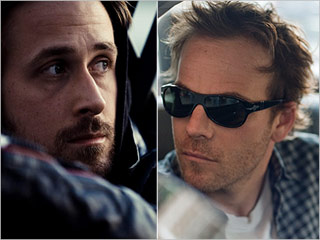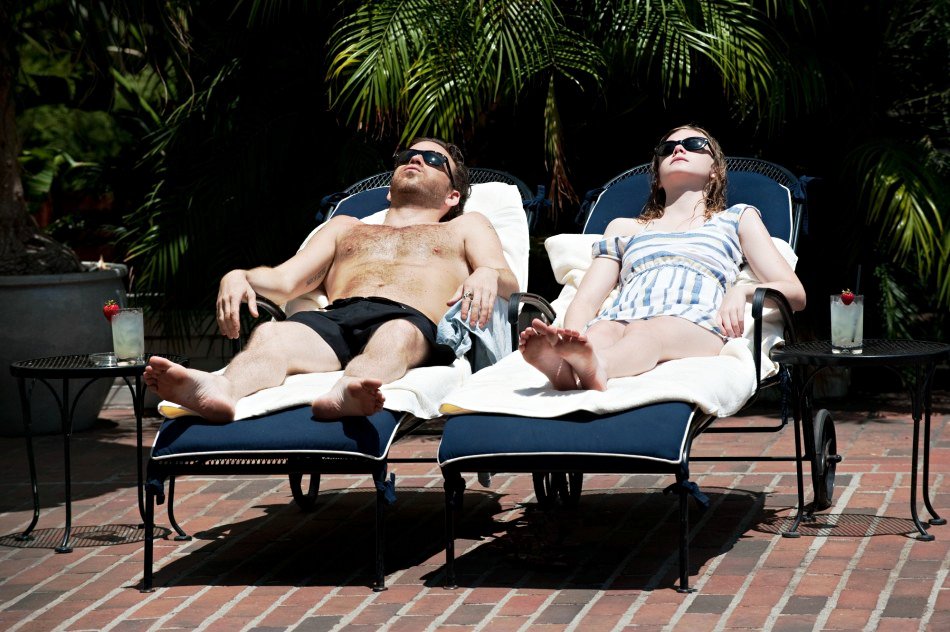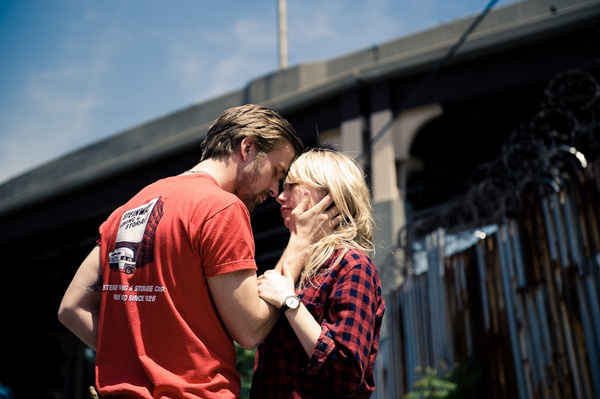
The Academy Awards are now behind us. (To no one’s surprise, the well-intentioned but perfunctory Oscar bait that was The King’s Speech reeled in Best Picture. FWIW, I had it at #18.) And, it being March, the cineplexes are happily on the verge of thawing out from the usual early-year dumping-ground phase. No more Sandler-Aniston rom-coms or Single White Female knockoffs: Beginning with The Adjustment Bureau this Friday, there’s actually a movie I’m interested in seeing every weekend for the next five weeks.
So, it’s probably a good time to catch up on two reviews I’ve neglected over the past several months: I caught Sofia Coppola’s Somewhere in mid-January and Derek Cianfrance’s Blue Valentine in mid-February, and, to get right to the chase, both are really underwhelming.
EW’s usually astute Owen Gleiberman took this pair together as the “return of the American art film,” but I think that’s only true in the 21 Grams sense. As I wrote of that film, a similarly leaden and overpraised pile of drek, in 2004: “This film just ambles around in its terminally depressed jag for so long that it loses any sense of perspective, and instead becomes just a vehicle for indulging the arthouse fallacy that misery is a substitute for character.” That same fallacy is in full effect in both of these pictures.

That being said, after quite liking Lost in Translation and sorta admiring the attempts of Marie Antoinette and The Virgin Suicides, I thought Sofia Coppola descended into self-parody with this flick. The story of a depressed movie star (Stephen Dorff) who reconnects to life by hanging with his tweenage daughter (Dakota Fanning), Somewhere is a ponderous and trite arthouse essay on the perils of oh-so-exhausting celebrity and the redemptive powers of fatherhood. Honestly, who knew being a movie star at the Chateau Marmont was so gosh-darned depressing? I hate being at an endless party and having to constantly fend off the attentions of beautiful women!
Now The King’s Speech had a similar “poor-little-rich-boy” problem to my mind — sorry, I guess I’m just a class warrior these days. But it’s more aggravating here, mainly because, unlike Colin Firth’s King-to-be, Stephen Dorff’s megastar barely registers as a personality at all. (It’s not Dorff’s fault. He does what he can with what he’s been handed.) Desultory and taciturn to the point of seeming medicated, he’s less of a character throughout than an allegory for the Tragedy of Stardom, or the Crisis of the American Male — he falls asleep during strip shows, he falls asleep during sex, he frets about his hairline. It’s like he wandered out of some earnest undergrad’s post-Pilgrim’s Progess homework assignment.
What goes for Dorff — and Fanning; she’s pixieish and that’s about it — goes for the entire movie: It purports to be this deep, thick-description type look at celebrity and family, and yet it consistently languishes in the shallows. To take only the first example, Somewhere begins with a sportscar (driven by Dorff) circling a desert race track, in and out and in and out and in and out of the frame. This goes on several beats too long, just so everyone gets the point: Look, this man is lost! He’s going around in circles! Now imagine that sort of ham-handed symbolism, held too long, over and over again, and you pretty have much the rub of Somewhere. I suppose a defender might argue that this racing scene helps acclimate people to the languid arthouse rhythms of this picture. Well, there’s languid, and there’s just plain inert.

Speaking of inert, Derek Cianfrance’s dolorous Blue Valentine showcases some decent acting from Michelle Williams — I’ll get to Ryan Gosling in a bit — and it’s always a kick to see Major Rawls (John Doman), who shows up here as Williams’ take-no-guff father. But this film suffers from a fatal flaw that undermines the entire experience: Namely, if a couple never seems to be all that great together in the first place, it’s hard to get too broken up about them falling apart.
And fall apart they do: If the ghost of Godfather III haunts Somewhere (i.e. Sofia Coppola working out her issues with her famous dad), then Blue Valentine‘s conceit is that it’s basically the relationship version of The Godfather II: We watch, simultaneously, both the first pangs of love and the last throes of collapse for star-crossed couple Dean (Gosling) and Cindy (Williams). This is a clever idea to be sure, but the execution is lacking. Mostly, we’re just left with a lot of arty strutting and fretting, sound and fury, but no real entertainment or wisdom to be had.
Judging from the small child who’s a plot point on both ends of this story, the span of distance between Dean and Cindy’s meet-cute and marriage here is about six years or so. (Apparently, enough time for Dean to go from looking like Ryan Gosling to going bald, half-blind, paunchy, and full-trucker. Tough six years, I guess.) Their early meetings are tentative and occasionally promising, their later marriage frigid and always jagged: Even a conjugal trip to the Moon Room at the local sleazy motel turns out to be a disaster. (I have to admit, I kinda dug the Moon Room, and irrationally thought less of these characters for having such a hellish time there.)
In their young’un phase, we see Cindy tap-dance along while a ukulele-playing Dean croons “You Always Hurt the One You Love.” (Symbolism alert!) Like me, you may have seen this in the trailer and thought, ah, this looks honest and sweet — might be good. But that’s it as far as the happy-go-lucky wooing goes — That’s basically the extent of their romantic connection. Pretty soon thereafter, Cindy [Spoiler] is knocked up with what might be Dean’s kid, and the angst flows anew. Gee, who could’ve figured this wouldn’t work out? And how much relationship mileage can one really expect to get out of a single ukulele cover?
Speaking of the uke, Ryan Gosling’s Dean — much like Stephen Dorff in Somewhere — seems more like a collection of tics than a character, although this time I think it’s the actor’s fault. In the past, I’ve been neither here nor there on Gosling: Word is he’s great, but I haven’t really seen him in anything before. Here, though, he’s just over the top in his Method mannerisms. (Williams is considerably better, mainly because she’s much more understated, but she isn’t really given the benefit of a character either. Sadly, she’s more just a reaction sponge to whatever Gosling is doing.)
When first we meet Dean (in the past, that is), he’s a high-school dropout working as a mover, so not what you’d call a book-learned fellow. Ok, that’s fine. But that alone doesn’t explain why Gosling basically tries to play him as Simple Jack. Often — say, when he eats breakfast with his daughter Frankie or first meets Daddy Rawls — he acts like Unfrozen Caveman Boyfriend. Ah don’t know much but ah sure do love mah [Frankie/dog/Cindy]! And the rest of the time, particularly when he’s wheedling (which is often), he just keeps repeating himself, more and more plaintively, like he can only keep one thought in his head. It’s like listening to Berkeley whine when he has to go out.
And so two hours are spent watching this brittle pair cringe and insinuate and generally just be awful to and around each other — There’s just not much there, frankly, particularly if you’re not invested in the couple. Blue Valentine is being billed by its proponents as “raw,” but to me it just felt half-formed, like somebody filmed an actor’s workshop. (Apparently much of the film was ad-libbed — It shows.) Without a connection forged between these characters, they’re just miserable all the time. And I said at the top, misery alone is no substitute for character.

